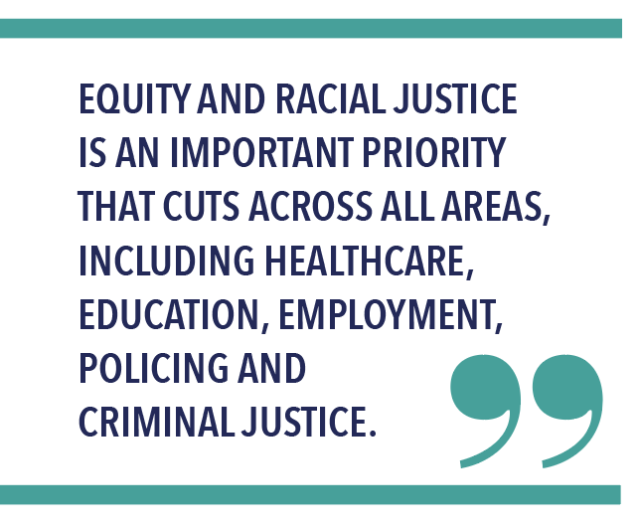It’s been a busy few months, with ongoing advocacy with Congress and federal agencies while simultaneously preparing for a new administration and Congress that begins in January. Below we provide a few key updates and lay out expected priorities for the coming year.
UPDATES:
Congress: On December 27, the Consolidated Appropriations Act was signed into law, which includes both general government funding and coronavirus relief provisions. While the coronavirus relief provisions include some urgently needed aid, they do not address the most pressing disability community priorities, like dedicated funding for home and community-based services (HCBS). HCBS funding is urgently needed to help people with disabilities and older adults live safely in their homes during this pandemic. Additional stimulus checks are also provided, but adults with disabilities who qualify as dependents are once again excluded.
- More on the priorities that did and didn’t make it into the bill can be found here.
- Find additional section-by-section summaries of the bill and one page summaries here.
- A comparison of the Consolidated Appropriations Act and other recent coronavirus relief proposals can be found here.
The bill does, however, extend funding for the Money Follows the Person (MFP) program for three years, along with spousal impoverishment protections. While we have been advocating for permanent funding of MFP and will continue to do so, this will provide states with long-term funding at a time when transitions are more crucial than ever. It also includes important changes to the program, including lowering the number of days someone has to spend in an institution before qualifying for MFP from 90 days to 60.
It also, importantly, did not include the liability shields Republicans have long been pushing for, discussed in previous columns, which would waive civil rights and workplace protections and shield businesses, non-profits, schools and medical providers from liability related to COVID-19 in most circumstances. We will continue to fight efforts to include similar provisions in future coronavirus relief legislation.
Vaccine Allocation: The disability community has been heavily engaged around allocation of coronavirus vaccines. We have been advocating for the needs of people with disabilities to be prioritized in the national framework being developed by the federal government, including with the Centers for Disease Control and Prevention’s Advisory Committee on Immunization Practices (ACIP).
National disability groups released principles for vaccine allocation, which include, among other things, prioritizing people in all congregate settings and who receive home and community-based services (HCBS) and of workers in those settings; ensuring that both the information and the means of distribution are accessible; and ensuring compliance with federal civil rights law and guidance. We have also been working with state advocates as they review their states’ plans for vaccine allocation and will continue to keep you updated on this fast-moving issue.
Priorities for the New Administration and Congress:
Disability advocates have been preparing for the new administration and Congress. Through our coalition work, we have developed congressional and federal agency priorities in a range of areas that impact people with disabilities. We also have been meeting with the transition teams that will be working with new agency leadership on priorities. Below we highlight some areas where we expect to focus our advocacy:
COVID-19:
Administrative Priorities: The Biden-Harris administration has already said that addressing COVID-19 will be its top priority. President-elect Biden has established a COVID-19 Advisory Board and a White House position focused on healthcare equity. Disability advocates sent a letter to and met with the COVID-19 Advisory Board about our top priorities, including ensuring people with disabilities are prioritized in vaccine distribution; fighting against discriminatory medical rationing; expanding mandatory COVID-19 reporting and testing to all Medicaid-funded congregate settings; ensuring all providers and program participants – both institutional and HCBS – have access to needed personal protective equipment (PPE); and implementing a national strategy to assist people in transitioning from high-risk institutional and congregate settings to safer community settings.
- More on the disability community’s priorities for vaccine allocation, as well as federal resources and state plans can be found here.
- Find out more about our advocacy in congregate settings during COVID-19 here.
Congressional Priorities:
We will be urging Congress to pass additional coronavirus relief that meets the needs of the disability community. Our top priority has been additional funding for HCBS. Other priorities include additional funding for Medicaid; housing; education and nutrition assistance; hazard pay for direct service providers and other essential workers; and recovery rebates. We will also continue to oppose the liability shields discussed earlier.
- For more on passed and proposed legislation, see our COVID-19 legislation page.
- Find the latest on advocacy and action that you can take on our COVID-19 page.
Community Living:
Administrative Priorities: The Biden-Harris administration has said that expanding and strengthening the “caregiving infrastructure” – including HCBS for people with disabilities and older adults – is a key priority as part of its economic recovery plan, as well as crucial to addressing COVID-19. We will be advocating with federal agencies about the many ways to expand HCBS, including strong implementation of the HCBS Settings Rule, strengthening the workforce and working with states as they unwind COVID-19 emergency waivers to permanently incorporate positive changes, like expanded telehealth.
- For more on the HCBS Settings Rule, check out the HCBS Advocacy Coalition.
- For more on COVID-19 emergency waivers, check out our web page.
Congressional Priorities: We expect to see legislation to expand access to HCBS, including reintroduction of the HCBS Infrastructure Investment Act, which provides a grant program for states to strengthen their HCBS systems. Legislation to address long waitlists and Medicaid’s institutional bias and to expand long-term care outside of Medicaid is also possible. Advocates will also continue to push for permanent reauthorization of MFP, as discussed above.
Disability Employment:
Administrative Priorities: Then-candidate Biden made strong commitments to expand opportunities for competitive, integrated employment (CIE) and to work to end subminimum wages to people with disabilities under Section 14(c) of the Fair Labor Standards Act. We will push the new administration in these areas. We also have emphasized that any COVID-19 recovery focus on displaced or unemployed workers must include people with disabilities.
Congressional Priorities: We expect re-introduction of the Transformation to Competitive Employment Act (TCEA), a bipartisan bill that would expand opportunities for CIE while phasing out the use of subminimum wages under Section 14(c) over six years. The Raise the Wage Act, which eliminates the payment of subminimum wages to people with disabilities, is a top Democratic priority as well and will likely be one of the first bills passed by the House.
Other Priorities:
Healthcare: Based on the priorities of then-candidate Biden, we expect the administration to quickly rescind policies that weaken Medicaid, like permitting states to condition Medicaid eligibility on work requirements or to block grant funding. Advocates will also work with the administration to rescind the public charge rule, which prohibits immigrants who use or may use healthcare programs, including Medicaid HCBS, from entering the country or getting a green card. We also expect efforts to strengthen the Affordable Care Act (ACA), and there are many competing healthcare proposals that will likely be introduced or reintroduced in Congress. However, it is unlikely that a huge healthcare bill will pass in the 117th Congress unless the ACA is struck down.
Inclusive Education: Priorities for the Department of Education include strengthening implementation of rules related to racial disproportionalities in special education; stronger enforcement by the Office of Civil Rights; and reinstating guidance around discipline and positive behavioral supports. In Congress, we expect to see reintroduction of the Keeping All Students Safe Act, which would eliminate seclusion and significantly limit the use of restraints, including for students with disabilities, who are at particular risk.

Racial Justice and Equity: Equity and racial justice is an important priority that cuts across all areas, including healthcare, education, employment, policing and criminal justice. It is critical for the disability community to identify intersectionalities and address the systemic barriers that people of color with disabilities face. President-elect Biden has identified racial equity as a top priority, and we expect that all federal agencies will be incorporating it into their work. Congress also will likely introduce legislation focused on equity and racial justice in a range of areas.
These updates represent only a small portion of what we’re working on. For more on our work, visit our website and connect with us on Facebook and Twitter.
What You Should Know
- Congress has passed a government funding bill that provides three years of funding for Money Follows the Person (MFP). It also includes some coronavirus relief but leaves out the disability community’s most pressing priorities.
- As priorities and logistics for distributing coronavirus vaccines are being developed, advocates continue to meet with decision-makers to ensure people with disabilities and their needs are prioritized.
- The country will soon welcome a new presidential administration and Congress. Some of the topics on which advocates will collaborate with federal-level leaders include COVID-19, community
- living and disability employment.
- In addition, advocates will work to elevate issues related to healthcare, inclusive education and racial justice and equity.
Note: information current as of 1/5/21
